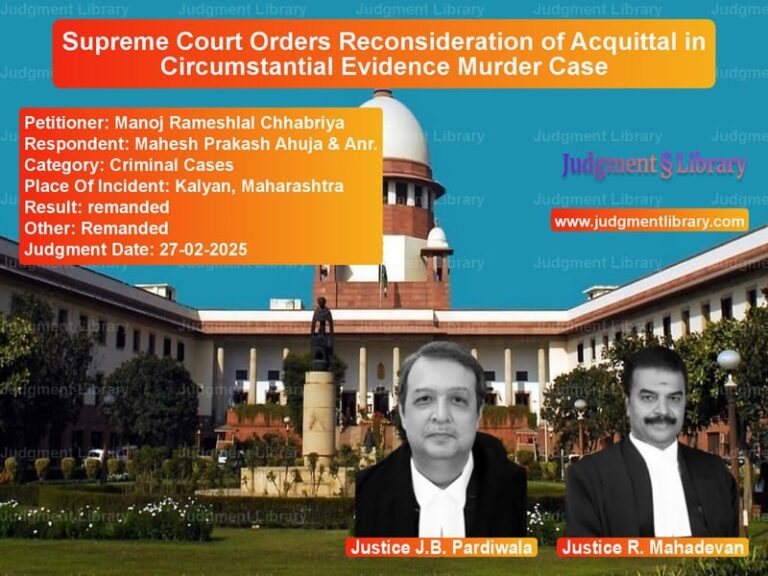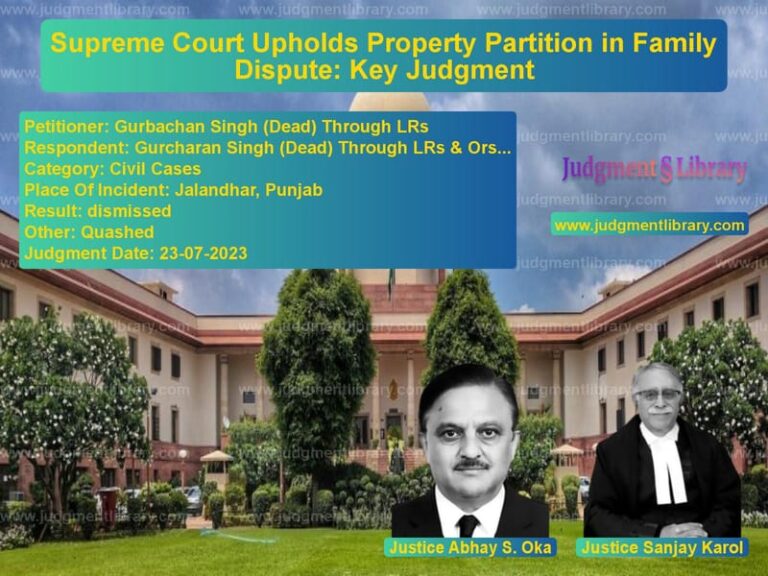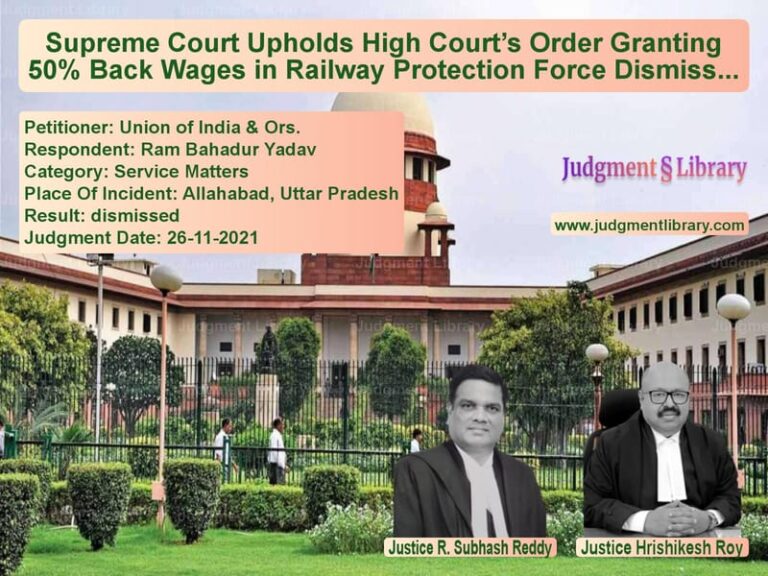Supreme Court Rules on Hindu Succession Act: Daughters Entitled to Parents’ Property
In a landmark ruling, the Supreme Court of India reaffirmed the rights of daughters under the Hindu Succession Act, 1956, by setting aside lower court decisions that had denied a daughter’s claim to her late parents’ property. The case, Shailendra Kumar Jain & Ors. vs. Maya Prakash Jain & Ors., arose from a dispute over family property following a partition among brothers in 1966.
The Court ruled that the daughters of the deceased were entitled to a share in their father’s and mother’s properties unless a legally valid will explicitly excluded them. The ruling clarifies that a past partition among male heirs does not disinherit daughters from their parents’ share of the property.
Background of the Case
The case involved a dispute among the legal heirs of Amba Prasad Jain and his wife, Devi Jain. The timeline of the events leading up to the Supreme Court ruling is as follows:
- 1966: A partition suit (Suit No.92 of 1966) was filed by Vinay Prakash Jain against his father, mother, and three brothers. The suit resulted in a settlement wherein the properties were divided among the father and sons. The sisters of the family were not granted any share.
- 2006: Maya Prakash Jain (one of the sons) filed Suit No.464 of 2006, claiming that a fresh family settlement had taken place in 2005 concerning joint properties, including the house.
- 2016: Srikanta Jain, one of the daughters, sought to be impleaded in the 2006 suit, claiming a right to the property after the death of her parents.
- 2016: The trial court rejected her application, ruling that she was not a necessary party to the case.
- 2018: The Allahabad High Court upheld the trial court’s decision.
- 2019: The Supreme Court overturned the High Court’s decision and ruled that the daughters were entitled to claim a share in their parents’ properties.
Arguments by the Appellants (Daughters of Amba Prasad Jain)
The appellants, representing the legal heirs of Srikanta Jain, argued that:
- Under the Hindu Succession Act, 1956, daughters are Class-I heirs and have equal rights in the estate of their deceased parents.
- The 1966 partition suit only settled property among the father and sons, but did not distribute the parents’ property.
- After the death of Amba Prasad Jain and Devi Jain, their estate should be distributed equally among all heirs, including the daughters.
- The courts had erred in denying them an opportunity to participate in the 2006 suit.
Arguments by the Respondents (Sons of Amba Prasad Jain)
The respondents, who had inherited the family property, countered:
- The family settlement of 1966 was final and excluded the daughters.
- The father and mother had executed wills leaving their property solely to their sons.
- The daughters did not challenge the 1966 decree for decades, which meant they had accepted the partition.
Supreme Court’s Observations and Ruling
The Supreme Court carefully analyzed the legal issues in the case and ruled in favor of the daughters.
1. Daughters’ Right Under Hindu Succession Act
The Court observed:
“On the death of the father and mother, if they died intestate, then under the principles of the Hindu Succession Act, every Class I heir, including the daughters, would be entitled to a share in the property left behind by their parents.”
This clarified that daughters could not be disinherited from their parents’ property unless a legally valid will excluded them.
2. 1966 Partition Did Not Extinguish Daughters’ Rights
The Court held:
“The partition effected pursuant to the decree in the 1966 suit cannot, in any way, disentitle the daughters from claiming a share in the properties of their father and mother.”
Since the daughters were not part of the 1966 settlement, they were still entitled to claim their parents’ share.
3. Need to Prove Validity of Wills
The Court ruled that the alleged wills of Amba Prasad Jain and Devi Jain must be proven before the daughters could be excluded:
“If the wills are not proved, the daughters would be entitled to a share in the properties, being Class-I heirs.”
Final Ruling
The Supreme Court allowed the appeal and ruled:
- The daughters were entitled to claim a share in their parents’ properties.
- The trial court and High Court orders denying the daughters’ impleadment were set aside.
- The daughters were added as necessary parties to the 2006 suit.
Implications of the Judgment
The Supreme Court’s ruling reinforces the legal rights of daughters under the Hindu Succession Act and sets an important precedent:
- Equal Property Rights: Daughters have equal rights to their parents’ properties, even if past settlements did not include them.
- Protection Against Gender Discrimination: The ruling strengthens gender equality in Hindu inheritance laws.
- Requirement to Prove Wills: Inheritance claims based on wills must be properly proven in court.
- Fair Share in Ancestral Properties: Daughters cannot be arbitrarily excluded from family estates.
The Supreme Court’s decision in Shailendra Kumar Jain & Ors. vs. Maya Prakash Jain & Ors. marks another step toward ensuring equal property rights for women under Indian inheritance laws.
Petitioner Name: Shailendra Kumar Jain & Ors..Respondent Name: Maya Prakash Jain & Ors..Judgment By: Justice Uday Umesh Lalit, Justice Indu Malhotra.Place Of Incident: Allahabad, Uttar Pradesh.Judgment Date: 09-04-2019.
Don’t miss out on the full details! Download the complete judgment in PDF format below and gain valuable insights instantly!
Download Judgment: Shailendra Kumar Jai vs Maya Prakash Jain & Supreme Court of India Judgment Dated 09-04-2019.pdf
Direct Downlaod Judgment: Direct downlaod this Judgment
See all petitions in Property Disputes
See all petitions in Succession and Wills
See all petitions in Judgment by Uday Umesh Lalit
See all petitions in Judgment by Indu Malhotra
See all petitions in allowed
See all petitions in Remanded
See all petitions in supreme court of India judgments April 2019
See all petitions in 2019 judgments
See all posts in Civil Cases Category
See all allowed petitions in Civil Cases Category
See all Dismissed petitions in Civil Cases Category
See all partially allowed petitions in Civil Cases Category







